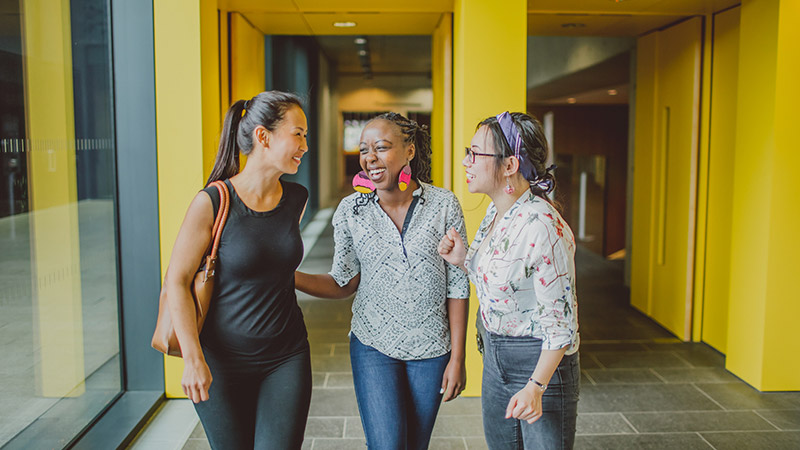Education (Artist Teacher Practice)
MA
Expected move to Headington Campus for the start of the 2025/26 academic year
Start dates: September 2025 / September 2026
Part time: 3 years
Location: Harcourt Hill, Distance learning
Department(s): School of Education, Humanities and Languages
Overview
Our MA Education (Artist Teacher Practice) will help you understand your artist teacher roles in a wider context and provide the space to explore complicated issues. You’ll develop a meaningful artistic practice, push boundaries, and take creative risks to broaden your art teaching skill set.
Surrounded by art educators and professional artists from across the world, you'll have the freedom to take your practice in any direction you choose. You will develop a professional artist profile and exhibit to different audiences. You will choose different locations to work in, whether that's schools, colleges, artist studios or museums and galleries.
By the end of the course, you’ll be equipped to take your teaching and making to the next level with a professional practice that stands up to artistic scrutiny.

Why Oxford Brookes University?
-
Flexible learning
We offer on-campus and distance learning options to suit your lifestyle and location, meaning you can work alongside the course and join from anywhere in the world.
-
Home to experts
You’ll be taught by expert academics with significant experience in teaching, making art and research, as well as international and national profiles.
-
Enviable partnerships
Working closely with the Pitt Rivers Museum, you’ll have the opportunity to collaborate with curators, researchers, makers and many more.
-
Be at the cutting edge
Develop a meaningful artistic practice, exploring the complexities of hot topics like decolonisation, misappropriation of culture, gender, and discourse in society.
-
Boost your career
Many of our graduates go on to gain promotions. With the support of academics and alumni, you’ll be ready to advocate for art in the setting you work in.
Course details
Study modules
You’ll need to achieve 180 credits over the course of your studies. This includes 140 credits of compulsory modules, and 40 credits from optional modules.
Please note: As our courses are reviewed regularly as part of our quality assurance framework, the modules you can choose from may vary from those shown here. The structure of the course may also mean some modules are not available to you.
Research
The School of Education, Humanities and Languages is a thriving centre for educational research and teacher professional development. Students on master's level programmes therefore join a large research community comprising researchers at all levels of higher education study.
We hold two major research conferences each year - the School of Education Research Conference and the EdD Colloquium. All students are invited to attend our annual Research Seminar Series (which attracts both internal and external speakers). We also organise a number of conferences, lectures, seminars and debates, some of which have an international reach.
The School’s six research groups exist to encourage engagement in research, publication, conference presentations, seminars and workshops:
- Inclusion and Wellbeing
- Policy, Partnership and Leadership
- STEAM pedagogy and learning
- Humanistic Perspectives on Education
- Early Years
- Applied Linguistics
View all staff profiles for the School of Education, Humanities and Languages

Careers
Perhaps you have experience with early year pupils, higher education students, or you’re an artist with an interest in education – looking to be challenged in your subject. Maybe you’re determined to develop your own practice, meet your CPD needs and progress your career. Or you could be searching for community in your field. Whatever your background, you don’t need a qualification in teaching. However, we do ask that you have an undergraduate degree or significant experience in your field, and work with art and education in some capacity.
After you’ve completed the course you’ll have developed a strong skill set as an artist teacher and be prepared to step into the professional art scene. You could be influencing school leadership, managing OFSTEDs, progressing to head of department in school, jumping into university teaching and research, or launching your career as a professional artist.
Related courses
Entry requirements
Specific entry requirements
Applicants need to be working in art education in some capacity. It is preferable that candidates have a first degree in education or an art-related practice, although this can be negotiated according to individual circumstance. Applicants do not need Qualified Teacher Status.
Please also see the University's general entry requirements.
English language requirements
IELTS level 6.5 or above with a minimum of 6.0 in reading and writing and 5.5 in speaking and listening.
Please also see the University's standard English language requirements.
Pathways courses for international and EU students
We offer a range of courses to help you meet the entry requirements for your postgraduate course and also familiarise you with university life in the UK.
Take a Pre-Master's course to develop your subject knowledge, study skills and academic language level in preparation for your master's course.
If you need to improve your English language, we offer pre-sessional English language courses to help you meet the English language requirements of your chosen master’s course.
English requirements for visas
If you need a student visa to enter the UK you will need to meet the UK Visas and Immigration minimum language requirements as well as the University's requirements. Find out more about English language requirements.
Terms and Conditions of Enrolment
When you accept our offer, you agree to the Terms and Conditions of Enrolment. You should therefore read those conditions before accepting the offer.
How to apply
Application process
All UK and International applications for this course; please make your application direct to the university.
Tuition fees
Questions about fees?
Contact Student Finance on:
Tuition fees
Fees quoted are for the first year only. If you are studying a course that lasts longer than one year, your fees will increase each year.
The following factors will be taken into account by the University when it is setting the annual fees: inflationary measures such as the retail price indices, projected increases in University costs, changes in the level of funding received from Government sources, admissions statistics and access considerations including the availability of student support.
How and when to pay
Tuition fee instalments for the semester are due by the Monday of week 1 of each semester. Students are not liable for full fees for that semester if they leave before week 4. If the leaving date is after week 4, full fees for the semester are payable.
- For information on payment methods please see our Make a Payment page.
- For information about refunds please visit our Refund policy page
Additional costs
Please be aware that some courses will involve some additional costs that are not covered by your fees. Specific additional costs for this course are detailed below.
Compulsory costs
| Additional costs | Amount (£) |
|---|---|
| You will need to purchase materials for the compulsory module Developing Personal Artistic Practice. | £100 |
Optional costs
| Additional costs | Amount (£) |
|---|---|
It’s your responsibility to cover print / binding costs where coursework submission is required. Please note that a lot of the coursework is now submitted online. |
From £30 |
| You may choose to purchase books to support your studies. Many books on our reading lists are available via the Library, or can be purchased secondhand. | £20-60 per book |
Accommodation fees in Brookes Letting (most do not include bills) |
£94-265 per week |
Accommodation fees in university halls (bills included, excluding laundry costs) |
£122-180 per week |
Graduation costs include tickets, gowning and photography. Gowns are not compulsory but typically students do hire robes, starting at £41. |
Typically £0-200 |
Students are responsible for their own travel to and from university for classes. BrookesBus travel is subsidised for full-time undergraduate students that are on a course with a fee of £9,250 or more, or living in an Oxford Brookes hall of residence. There is an administration fee for the production of a BrookesKey. |
From £10 |
Funding your studies
Financial support and scholarships
Featured funding opportunities available for this course.
All financial support and scholarships
Programme changes:
On rare occasions we may need to make changes to our course programmes after they have been
published on the website. For more information, please visit our
changes to programmes page.

